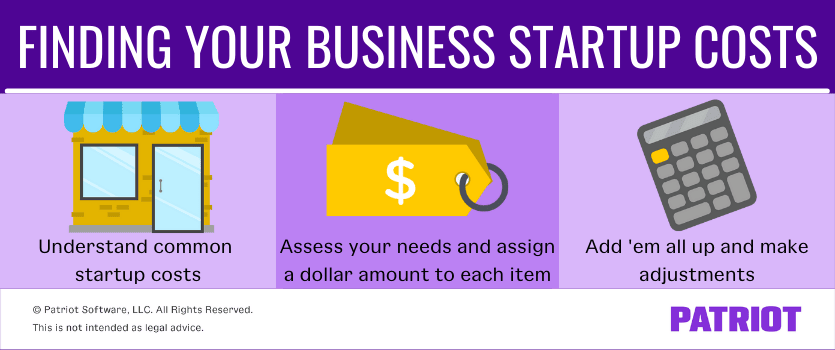The average cost to start a business is less than $10,000. But, every business is different. So if you have a million-dollar business idea, you probably want to know what it’s going to cost you. How much does it cost to start a business, exactly?
Although there’s no neat little price tag on your entrepreneurial dream, you can put together an estimate before jumping in. To do that, you need to understand common startup costs and your business’s specific needs.
How much does it cost to start a business?
Startup expenses are the costs you incur before making money from your business. In short, they’re the expenses that launch your company. Knowing how much money does it take to start a business helps you plan accordingly, claim small business tax deductions, and manage financial records.
Unfortunately, there are countless factors that can influence the cost of starting a business. There are businesses with low startup costs and others with high startup costs. Are you planning to open a home-based business or storefront? What’s your industry? Will you have inventory? How about shipping? The list goes on and on.
If you want to know how much money you need to start a business, you can take three simple steps:
- Understand common startup costs
- Assess your needs and assign a dollar amount to each item
- Add ‘em all up and make adjustments

And … voila! You’ve got a great starting point for your startup cost estimate.
1. Understand common startup costs
To answer How much to start a business?, you need to familiarize yourself with common startup costs, such as:
- Office space
- Utilities
- Equipment
- Inventory
- Insurance
- Licenses and permits
- Professional fees
- Marketing
- Other
Keep in mind that businesses may share similar cost categories, but the price each business pays can vary drastically. Take a closer look at each common startup expense category.
Office space
Your office cost depends on what kind of space you need, your location, and the size. So when it comes to setting up shop, ask yourself a few questions, such as:
- How much space do I need?
- Do I want a storefront, or can I run my business out of my home?
- If I do want a storefront, would I rather buy vs. lease commercial property?
- What area would be best to open my business in?
- How much is the security deposit or down payment?
Utilities
Ah, utilities. They may seem like small expenses here and there, but they can quickly add up. The last thing you want to do is forget to budget for several “small” costs and wind up footing a rather hefty utility bill.
Common utilities include:
- WiFi
- Electric
- Gas
- Water
- Sewer
- Phone
- Cable
You may also need to pay for equipment or put down utility deposits.
Equipment
More than likely, you’ll want the help of some handy equipment to bring your business vision to life. Consider what type of items you’ll need to rent or buy like:
- Copier
- Printers
- Computers
- Vehicles
- Software (e.g., accounting software)
If you plan on having a storefront, you may also need to budget for things like furniture, appliances, and light fixtures.
Inventory
If you want to open a goods-based business, you need some inventory to get things going. You can estimate the cost of inventory by:
- Determining how much of each type of good you need
- Speaking with potential suppliers to find out cost ranges
- Considering the cost of inventory storage (e.g., warehouse)
Insurance
Like life, there are so many unknowns in business ownership. To help you mitigate damages associated with the unexpected, you can sign up for insurance.
There are a number of types of business insurance, such as general liability, errors and omissions, and commercial property. Of course, you probably don’t need each and every type of insurance out there.
Licenses and permits
Business license, sales tax permit, building permits, oh my! Depending on your business, you may need some licenses and/or permits to legally operate.
Contact your state and locality to determine what types of licenses and permits you need.
Professional fees
Need a professional to get your business started? Whether it’s a small business lawyer, accountant, or both, you probably need some help getting set up.
And if you do decide to hire a professional, factor in costs such as one-time consultations or check-in fees. If you’re not sure how much this could cost in your area, call around to get estimates.
Marketing
You don’t have to spend an arm and a leg on marketing expenses. But, you should do some marketing when launching your business—if you want prospective customers to know about your startup.
Consider what types of marketing—and how much each costs—you want to pursue when launching your business, such as:
- Social media ads
- Pay-per-click ads
- Blog
- Email marketing
- Business cards
- Flyers and signage
Other
The list doesn’t end with these neatly categorized startup costs. Other common expenses may include shipping fees, payments to independent contractors, and credit card processing fees.
Brainstorm any additional costs you feel you may have to be thorough. When in doubt, consult a professional (e.g., accountant) or another business owner for guidance.
2. Assess your needs and assign a dollar amount to each item
Sure, there are a number of startup costs out there. But, your business is different. You may not need every type of startup expense in the book. So, put together a list of what you need to launch your enterprise.
Assessing your needs ahead of time helps you prepare and can improve your chance of success. Not to mention, you can better understand your break-even point and manage cash flow by knowing your needs.
Make a list of the costs you expect for the startup. Separate the costs into categories, such as capital expenditures (aka one-time purchases) and recurring expenses. Also decide if the startup costs are fixed or variable. Fixed costs recur periodically at the same amount (e.g., rent). Variable costs change with operations (e.g., business shipping costs).
Have your list of possible startup costs? Time to check it twice. Make sure you’ve covered all your bases to avoid underestimating the cost to start a business.
Once you’re sure you’ve listed everything you need, assign a dollar amount to each item. To get these figures, you can:
- Do some research
- Contact possible vendors and suppliers
- Consult an accountant or small business lawyer
If you’re worried about underestimating your costs, you can assign costs to a miscellaneous category to catch any expenses you’ve forgotten.
3. Add ‘em all up and make adjustments
After estimating roughly how much each type of expense will cost you, add them up for a total of your startup costs. Is the figure outside of your spending limit? No worries. You can:
- See if you can remove or substitute anything on the list
- Consider other small business funding options
If you are set on bootstrapping your business, separate your costs into must-haves and nice-to-haves. Cut out anything you can run your business without (at least initially). And, remember to factor personal expenses into your startup cost calculation, such as your rent or mortgage, utilities, loan payments, groceries, etc. Small business startup costs are an addition to your existing liabilities.
You should have at least a few months’ operating costs set aside before you start your business. If you don’t have enough, or if you can’t cut business startup costs, you can look into additional financing. For example, you could apply for an SBA or bank loan, apply for an investment, or apply for a business credit card.
This article has been updated from its original publication date of April 21, 2017.
This is not intended as legal advice; for more information, please click here.



